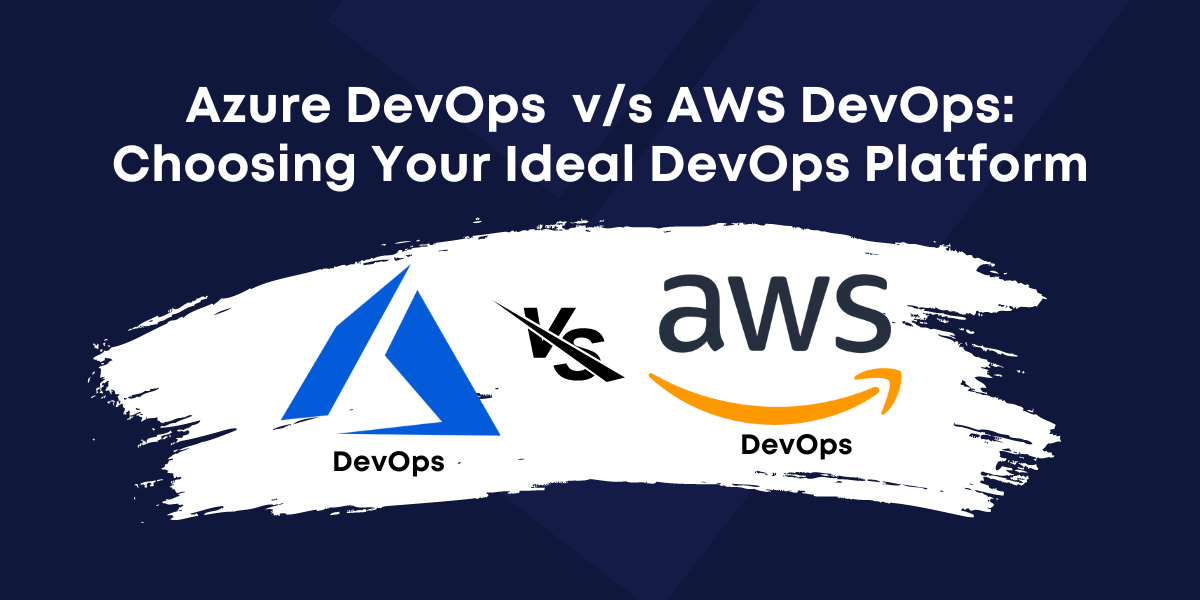Azure DevOps vs. AWS DevOps: Choosing Your Ideal DevOps Platform
In today’s fast-paced digital landscape, the adoption of DevOps practices has become essential for organizations aiming to streamline their software development and delivery processes. With the rise of cloud computing, platforms like Azure DevOps and AWS DevOps have emerged as key players, offering comprehensive solutions to support DevOps initiatives. In this article, we’ll delve into a comparative analysis of Azure DevOps and AWS DevOps to help you make an informed decision about which platform best suits your organization’s needs.
Introduction to DevOps
DevOps is a set of practices that combines software development (Dev) and IT operations (Ops) to shorten the systems development life cycle and provide continuous delivery with high software quality. It aims to automate and integrate the processes of software development and IT operations to improve collaboration and productivity across teams.
Overview of Azure DevOps
Azure DevOps, formerly known as Visual Studio Team Services (VSTS), is a suite of cloud-based collaboration tools provided by Microsoft Azure. It offers a range of services that cover the entire DevOps lifecycle, including source code management, build automation, release management, testing, and project management. Azure DevOps provides seamless integration with Azure services, making it an attractive choice for organizations already leveraging the Azure ecosystem.
Overview of AWS DevOps
AWS DevOps is part of the Amazon Web Services (AWS) suite of cloud services. It provides a collection of tools and services designed to facilitate DevOps practices on the AWS cloud platform. AWS DevOps integrates seamlessly with various AWS services like CodeCommit, CodePipeline, CodeBuild, and CodeDeploy, enabling organizations to take advantage of AWS-specific features and services for building and deploying applications.
Key Differences Between Azure DevOps and AWS DevOps
Service Integration
- Azure DevOps is tightly integrated with the Microsoft Azure ecosystem, offering seamless collaboration and leveraging of Azure services such as Azure Boards, Repos, Pipelines, and Test Plans.
- AWS DevOps is designed to work seamlessly with the AWS cloud infrastructure, providing integration with various AWS services like CodeCommit, CodePipeline, CodeBuild, and CodeDeploy.
Pricing and Cost Structure
- Azure DevOps offers a flexible pricing model with options for both per-user licensing and consumption-based pricing. It provides a range of plans suitable for different team sizes and requirements, with bundled pricing options for organizations utilizing Azure services.
- AWS DevOps pricing is primarily based on the usage of individual services within the AWS ecosystem. It follows a pay-as-you-go model, allowing organizations to pay for the specific resources and services they utilize, with pricing calculators and cost management tools available for estimation and optimization.
Ecosystem and Marketplace
- Azure DevOps benefits from the vast Microsoft ecosystem and marketplace, providing extensive integrations with popular development tools like Visual Studio, GitHub, and Azure Functions. The Azure Marketplace offers a wide range of extensions and integrations that enhance the functionality and extensibility of Azure DevOps.
- AWS DevOps integrates seamlessly with the broad range of AWS services, including computing, storage, networking, and databases. It leverages AWS CodeStar, a fully integrated service that facilitates the creation, management, and deployment of applications on AWS. The AWS Marketplace offers an extensive collection of third-party tools and services that can be integrated into AWS DevOps workflows.
Community and Support
- Azure DevOps benefits from Microsoft’s strong developer community and extensive support resources, including comprehensive documentation, tutorials, and forums. Microsoft also provides professional support plans for organizations requiring dedicated assistance.
- AWS DevOps benefits from the extensive AWS user community and its vibrant support ecosystem. AWS provides detailed documentation, best practices, and active community forums to help users navigate and troubleshoot their DevOps workflows. Various support plans, including options for technical assistance and architectural guidance, are also available.
Conclusion
In summary, both Azure DevOps and AWS DevOps offer robust solutions for implementing DevOps practices in organizations. Azure DevOps has strong integration with the Azure ecosystem, while AWS DevOps seamlessly integrates with the AWS cloud infrastructure. The choice between the two platforms depends on specific requirements, existing infrastructure, and familiarity with the respective cloud platforms. By carefully considering their unique features, service integrations, pricing models, ecosystem support, and community resources, organizations can make an informed decision and choose the DevOps solution that best aligns with their needs and goals.
Overall, it’s evident that Azure DevOps and AWS DevOps are both powerful platforms that cater to different organizational needs. Depending on your specific requirements, preferences, and existing infrastructure, one platform may be better suited to your DevOps journey than the other. Ultimately, the goal is to choose a platform that enables your organization to achieve its DevOps objectives efficiently and effectively.

